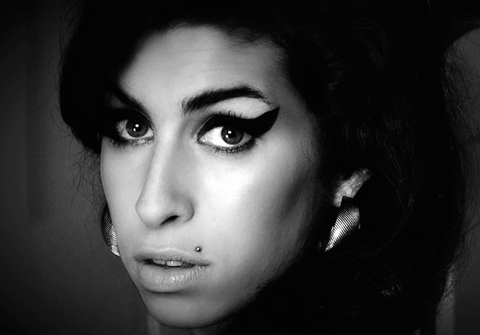Dir. Asif Kapadia. UK, 2015, 123 mins.

Asif Kapadia’s documentary Amy tells the sad and, it would appear, inevitably tragic story of the late jazz singer Amy Winehouse framed entirely through archive footage (much in the same style as Senna, which was made by the same team). Scores of interviews add a voiceover narration which cumulatively rescues Winehouse from her sorry fate as a paparazzi footnote – dead at 27 from alcohol poisoning after a long and public battle with drug addiction, devoured by the media and her own demons.
Amy is clearly a true film-making partnership between Kapadia, his editor editor Chris King and producer James Gay-Rees - it seems as if they all fell a little in love with Amy along the way, and encourage the viewer to do the same
No talking heads detract from Amy’s story throughout the film’s 123-minute running time; Kapadia aims to shine some love on Winehouse, and a good deal of direct light into what happened to the tiny Jewish girl from Southgate with the pure jazz voice. It’s uneasy viewing – a cautionary tale.
Premiering as a special screening at Cannes, Amy can look forward to healthy returns theatrically in the UK; international interest should also be strong, with TV and VOD very healthy in all markets. Awards attention is possible. Amy is the product of a media age, with seemingly endless footage of varying quality (mobile phone clips included) made available for an enormous research and editing task The picture they paint is often shocking - how completely Winehouse unravelled and the squalor of her addiction, although perhaps the biggest surprise is how she survived for so long in that condition. Also alarming is the extent of the conflicted roles played by Amy’s manager and family, in particular her father, who has already protested loudly to the British media about Amy.
Amy serves as a companion piece, of sorts, to Sundance title Cobain: Montage of Heck. Although the styles are different – Amy is a more straightforward presentation – the similarities between Amy and Curt are quite clear; both huge talents who were troubled from a young age; both devastated by their parents’ divorce at the age of 9; both dead at 27.
Kapadia has sourced considerable, previously-unseen private footage from the singer’s family and friends. (Amy was fully financed by Universal Music Group, parent company of her label Island Records.) The film shows Amy as she once was before she became a tabloid caricature; mouthy and challenging and endowed with a vast, natural talent. Deeply troubled, she is revealed to have suffered from depression and bulimia throughout her short life. She was also posessed by a prodigious appetite for hard drugs, booze and the wrong kind of man.
Kapadia and his team interviewed over 100 people in their endeavour, including her father Mitch and elusive ex-husband Blake Fielder, both enablers and uneasy testifiers. Whatever Mitch Winehouse might claim, though, Kapadia treads lightly over Amy’s early years when he left the family and she was already being treated for mental health issues and began to flirt with the bulimia which also hastened her death (which her parents treated with surprising indifference).
Amy starts with the singer aged 16 and already a featured soloist with the National Youth Jazz Orchestra. She moves out of her parent’s house at the first opportunity, to share an apartment with her best friend Juliette Ashby, who, with pal and former manager Nick Shymansky, provide Kapadia with an honest take on the young Amy, a “classic North London Jewish girl with a lot of attitude,’ according to Nick Gatfield, the head of Island Records at that time. She also moved out because she wanted to smoke weed all day, and had “issues at home”. “I don’t think I’m going to be at all famous,” she says back then. “I couldn’t handle it. I’d go mad.”
She did, of course. Life changed when Amy moved to Camden and became involved in a drugs-fuelled rock scene involving Pete Doherty and Trash nightclub, where Fielder worked on the door. The film then darts back to Amy’s childhood, with the revelation that by the age of 13 she was already bulimic and taking anti-depressants.
The scene is set then, for Amy’s tragic final act, when the singer with the giant ‘Daddy’s Girl’ tattoo missed multiple chances to clean up her act and made a series of bad decisions which led to her death, egged on by Fielder-Civil, riding the gravy train for all it was worth. The paparazzi revelled in every excess; chat show hosts, who once fawned over her, turned Amy into a joke, and her parents “didn’t want to take it on,” says one friend.( Meanwhile, her manager, Raye Cosbert, booked her on one failed gig after another.
Amy is clearly a mammoth archive and editing task and a true film-making partnership between Kapadia, his editor Chris King and producer James Gay-Rees, who all worked together on Senna, with Antonio Pinto providing a sympathetic score. It seems as if they all fell a little in love with Amy along the way, and encourage the viewer to do the same. It’s hard not to. Amy is a cautionary tale - she was the Janis Joplin of our age, and as it’s the media age, we get to see the full price of fame this time as a fragile talent self-combusts. It’s not a pretty picture.
Production company: On The Corner Film
International sales: Cornerstone Films, offcie@cornerstonefilms.com
Producer: James Gay-Rees
Executive producers: David Joseph, Adam Barker
Editor: Chris King
Music: Antonio Pinto
Archive producer: Paul Bell
Featuring: Blake Fielder, Andrew Morris, Darcus Beese, Janis Winehouse, Juliette Ashby, Mark Ronson, Mitch Winehouse, Nick Gatfield, Pete Doherty, Salaam Remi, Tony Bennett
























